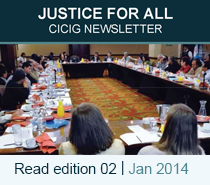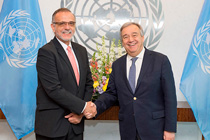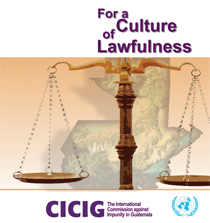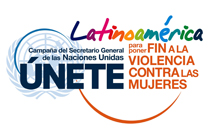 Guatemala, August 14, 2012. In a globalized world where crime is organized and knows no boundaries, it is necessary to tackle criminals with justice tools organized through cooperation and collaboration between countries.
Guatemala, August 14, 2012. In a globalized world where crime is organized and knows no boundaries, it is necessary to tackle criminals with justice tools organized through cooperation and collaboration between countries.
Extradition is a legal procedure used to arrest and transfer an accused person to a country where he or she committed a specific crime in order to try them before the courts of that country. A State is only obliged to grant the extradition of an individual if an international extradition treaty or an international extradition convention is in place with the State making the request.
When neither of the two documents exists, the State that receives the request is authorized to grant the extradition, but it is not obliged to do so. Furthermore, if the requirements established by the requested State are not complied with, the extradition will not be granted, even if a treaty or agreement is in place.
The following principles are included in international treaties and agreements:
- Regarding the sovereignty of each State: international cooperation must exist, because it is the only form of facing cross-border crime.
- Territoriality: the requesting State must have jurisdiction to try the crime of which the individual is accused.
- Reciprocity: both parties pledge to prosecute and try crimes committed by nationals of one party against the laws of the other, pursuant to their respective laws.
- Double incrimination or dual criminality: the act must be classified as a crime and it must be punishable under the laws of both states.
- Right not to be tried twice for the same offence: it must be verified that the accused party has not been tried, served a sentence or be pending trial in his or her country of origin if he or she is being requested in extradition for the same crime.
- Specificity: the extradited person will not be detained, accused or convicted in the requesting State for a crime committed prior to the date of the extradition request that differs from the crime for which extradition has been granted.
Cooperation
Michel Dibán, international extradition consultant, believes it is necessary that countries cooperate on extradition so that the authorities facilitate this type of proceeding and the accused party is sent to and tried in the requesting country. This would contribute to reducing the high levels of international crime.
Principles of international extradition treaties and agreements
- Respect for the sovereignty of each state
- Territoriality
- Reciprocity
- Double incrimination or dual criminality
- Right not to be tried twice for the same offence
- Specificity
He added that no judicial assistance had been provided to fight organized crime, and thus countries have to transfer evidence from one place to another to tackle criminals and obtain evidence against the accused parties.
In order to achieve this, the expert stated that each country's authorities must conduct joint investigations, apply special investigation techniques, coordinate cross-border controls, implement undercover operations, conduct controlled deliveries, intercept communications and hold property and financial investigations.
"If you want to tackle international crime, you must address the criminals and establish all the assets they have obtained and confiscate them. By doing so, it is possible to strip the criminals of power and bring them before courts of justice," he stressed. In other words, the finances of criminals must be targeted.
Extradition Law of Guatemala
In Guatemala, Decree 28-2008 provides for the Law on Extradition Procedures, which, in one of the paragraphs contained therein, states that the Law must be passed because the country is party to a number of international instruments. These instruments regulate extradition as a legal institution so that States are able to hand over people required by legal systems.
Guatemala has signed bilateral and regional extradition agreements with most Latin American countries, as well as signing global conventions related to transnational organized crime (corruption, money laundering, etc.).
One aspect taken into consideration when requesting an extradition from a State is the sentence carried by a crime. Even though there is no specific rule regarding the length of the sentence, normally, for an extradition to take place, it must be a minimum of one to four years. Furthermore, the country from whom the extradition is being requested must deem the actions taken by the accused party to be criminal acts.
Another means used under the older treaties (such as the 1903 agreement with the United States) is a list of crimes for which both States can request that a person be extradited. That is to say, it depends upon the political disposition of each State to establish which crimes are included in the treaties.
The procedure
States that request a person be extradited can order a provisional arrest warrant, without the need to undertake considerable formalities, to prevent the accused party from absconding. The requesting State must ensure that there is an arrest warrant or an order that must be complied with in the requesting country. In this case, the State that has requested the measure must formalize the extradition request within a set time limit (for example, between 40 and 60 days).
In Guatemala, the extradition is authorized by a judge, but the handing over of the accused party must be approved by the President of the Republic. In the absence of a specific time limit, the extradition procedure, without any setbacks, could last approximately two months. Crimes related to drug trafficking are most commonly the subject of extradition requests, especially those filed by the United States.
The responsibility of the MP
In the Law on Extradition Procedures, it is stipulated that the Public Prosecutor's Office (MP) is responsible for filing the extradition requests from requesting States (passive extradition) before national courts. Furthermore, the MP must file extradition requests on behalf of the State of Guatemala (active extradition), which will are then forwarded by the secretariat of the Supreme Court of Justice to the Ministry of Foreign Affairs—the body responsible for filing the request before the relevant State.
The Law also sets forth that passive extradition requests must be filed in accordance with the provisions of international agreements and treaties, and the interested State can request, through the appropriate diplomatic channels, that an individual be provisionally detained in Guatemala. Therefore, the arrest must be reported and the formal extradition request must be filed within the defined time limit.
In the case of an active extradition, the State of Guatemala, through the Ministry of Foreign Affairs, must file the request for provisional detention or formal extradition to the other State, pursuant to the provisions of international treaties or agreements.
Once all relevant procedural steps have been completed, and the State of Guatemala has been notified that the person subject to the extradition request is now in the hands of the respective authorities, the Ministry of Foreign Affairs must coordinate the reception and transfer of the accused party with the MP, the Ministry of the Interior and the court handling the case.


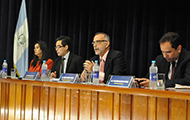
 Guatemala, August 14, 2012. In a globalized world where crime is organized and knows no boundaries, it is necessary to tackle criminals with justice tools organized through cooperation and collaboration between countries.
Guatemala, August 14, 2012. In a globalized world where crime is organized and knows no boundaries, it is necessary to tackle criminals with justice tools organized through cooperation and collaboration between countries. 
